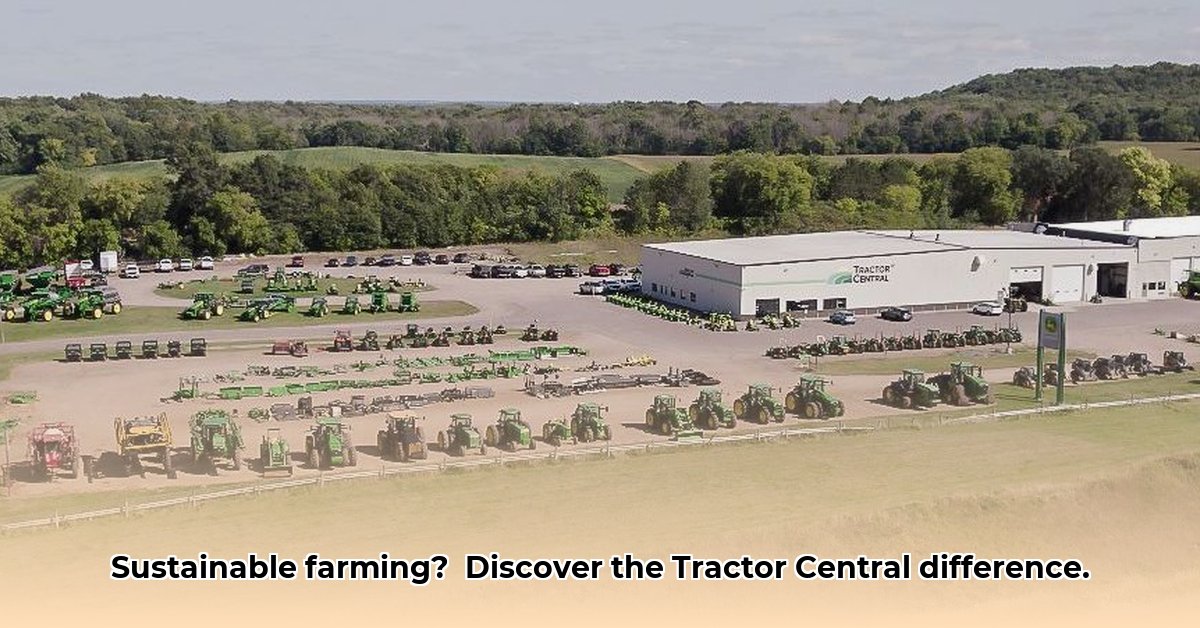
Assessing Tractor Central Chippewa's Commitment to Sustainable Agriculture
Tractor Central Chippewa (TCC) positions itself as a significant player in the agricultural equipment market. However, the extent of its commitment to sustainable farming practices requires closer examination. While customer satisfaction is prominently featured on their website, concrete evidence supporting their green initiatives remains limited. This analysis explores TCC's sustainability profile, considering the perspectives of various stakeholders and identifying areas for improvement. How can TCC strengthen its sustainability credentials and truly contribute to a greener future for agriculture? For more on tractor costs, see this helpful resource: Tractor Costs.
TCC's Sustainability Performance: A Critical Analysis
TCC's website emphasizes customer satisfaction, highlighting a 10-year limited powertrain warranty on its compact utility tractors. This warranty contributes to reduced waste by extending the lifespan of equipment, thereby minimizing the number of tractors destined for landfills. However, this is only one aspect of sustainability. Critical questions remain unanswered regarding the environmental impact of tractor manufacturing, including material sourcing, manufacturing processes, and end-of-life management. Transparency in these areas is crucial for a comprehensive evaluation of TCC's sustainability performance. What steps is TCC taking to reduce its environmental footprint across the entire product lifecycle?
Stakeholder Interests: A Multifaceted Perspective
TCC's long-term success hinges on balancing the interests of diverse stakeholders, including farmers, policymakers, equipment suppliers, and TCC itself. Short-term and long-term goals vary significantly across these groups:
| Stakeholder | Short-Term Goals (Next Year) | Long-Term Goals (3-5 Years) |
|---|---|---|
| Tractor Central Chippewa | Publicly disclose data on sales of eco-friendly equipment and energy efficiency metrics. | Develop a comprehensive sustainability strategy encompassing carbon emission reduction and waste minimization throughout the product lifecycle. |
| Farmers & Landowners | Access readily available information on fuel efficiency, emission reduction, and water-saving technologies. | Access expert advice and support from TCC for implementing sustainable farming practices using more efficient equipment. |
| Government Agencies | Transparent communication to ensure compliance with environmental regulations. | Collaboration on government initiatives promoting the adoption of green agricultural technologies. |
| Equipment Suppliers & Makers | Supply and manufacture more sustainable equipment components. | Establish enduring partnerships centered on sustainable manufacturing and responsible material sourcing. |
Data Transparency: The Need for Concrete Evidence
A comprehensive understanding of TCC's sustainability efforts necessitates greater transparency. Data on tractor sales, differentiating between electric and traditional models, and compact versus larger sizes, would provide valuable insights. Analyzing TCC's marketing materials to gauge its emphasis on sustainable farming practices would further illuminate its priorities. How can TCC improve its data reporting to build trust and demonstrate its commitment?
Potential Challenges: Navigating Technological and Regulatory Shifts
TCC faces significant challenges. Rapid technological advancements in farming equipment can lead to premature obsolescence and increased waste. The environmental impact of manufacturing materials and end-of-life disposal also requires careful consideration. Additionally, constantly evolving governmental regulations regarding emissions, fuel efficiency, and equipment disposal will significantly impact TCC’s operations. Proactive planning and adaptation are vital for navigating these challenges.
The Path to Greener Agriculture: Recommendations for TCC
TCC possesses substantial potential to become a leader in sustainable agriculture. However, realizing this potential demands enhanced transparency, proactive collaboration with stakeholders, and a forward-looking approach to environmental regulations. Openly sharing data, actively engaging with farmers and policymakers, and proactively addressing technological and regulatory changes will solidify TCC’s position as a key partner in shaping a more sustainable future for agriculture. Further research and ongoing data analysis are crucial.
Measuring the Environmental Impact of Compact Utility Tractors
Farmers are increasingly under pressure to adopt sustainable practices. Assessing the environmental impact of compact utility tractors requires a comprehensive approach, considering the entire product lifecycle from manufacturing to disposal.
Key Factors in Environmental Impact Assessment:
Fuel Consumption and Greenhouse Gas Emissions: Measuring fuel usage per hectare or hour, combined with emission factors for the specific fuel, allows precise calculation of direct greenhouse gas emissions.
Indirect Emissions: A life cycle assessment (LCA) is necessary to quantify emissions embedded in manufacturing and disposal processes.
Alternative Fuels and Technologies: Biodiesel, biomethane, and electric tractors present alternative options, although their own production and end-of-life impacts need analysis.
Optimizing Tractor Use: Proper maintenance, efficient operation, and precision agriculture technologies contribute to minimizing the environmental footprint and operational costs.
Data Collection and Analysis: A Multifaceted Approach
Comprehensive assessment requires detailed data collection across multiple aspects:
| Factor | Measurement Method | Data Source |
|---|---|---|
| Fuel Consumption | Track fuel usage per unit of work (hectares or hours) | Tractor's fuel gauge, operational records |
| Greenhouse Gas Emissions | Use emission factors for the fuel type and calculate emissions | EPA emission databases, fuel supplier data |
| Manufacturing Emissions | Employ LCA methodologies | Manufacturer data, industry reports |
| Disposal Emissions | Assess emissions from disposal or recycling | Waste management data, recycling processes |
| Land Use Change (if applicable) | Evaluate changes in land use due to tractor operations | Soil sampling and analysis |
This detailed approach underscores the complexity of measuring the true environmental impact and provides a template for TCC's ongoing efforts. A holistic strategy combining efficient practices, sustainable manufacturing, and supportive government policies represents the most effective path towards sustainable agriculture.